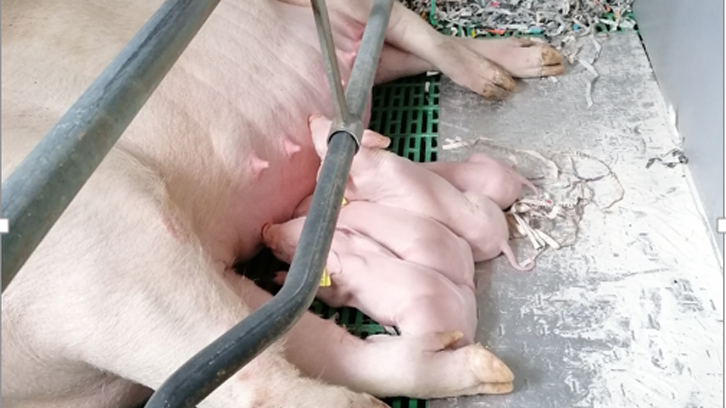Good practices and universal vaccination, proposals to minimize use of antibiotics against bacteria affecting pigs

Glaesserella parasuis causes Glässer's disease in recently weaned pigs. Faced with the problems of resistance and other secondary effects caused by antibiotics that impede an efficient immune response, the research group of Dr. Virginia Aragón at the IRTA concludes that the best prevention measures are good practices in piglet management and vaccination. The use of probiotics also may help strengthen the animal's microbiota.
Glässer’s disease is caused by Glaesserella (Haemophilus) parasuis and affects pork production around the world. This disease constitutes an economic problem, but more importantly also a health and welfare problem. It is also one of the causes of antibiotic use in swine farms. G. parasuis is a bacterial species that contains strains of variable virulence and immunological characteristics. A precise diagnosis is essential to stablish the proper control measures in the farms. In the last years, major improvements in diagnostic have emerged facilitated by genomic studies. Thus, PCRs for molecular serotyping were established, as well as PCRs for virulence prediction.
Disease is caused by virulent strains, usually in the post-weaning period, when the piglets present a reduction of maternal antibodies and are under big stress due to changes in their environment (weaning and change to solid food, mix with other litters,…). Management measures to ensure a correct colostrum intake during lactation, and later to ensure the correct ventilation and density of piglets, among other factors, are essential to control respiratory diseases, including Glässer’s disease. Antibiotics are commonly used in the control of bacterial infections in farms. This is due to the efficacy of these drugs and many times the lack of other adequate tools, such as effective vaccines. However, drug resistance is now a common concern in human and veterinary medicine, also for G. parasuis. A piece of data that illustrates this problem is the fact that more than 50% of Spanish G. parasuis isolated in HIPRA DIAGNOS laboratory from 2014-2017 showed resistance to flumequine and neomycin, two antibiotics classified on the Spanish national surveillance plan for antimicrobial resistance (PRAN) as category 2 (2nd choice or last resort use in veterinary medicine) and categorized by the WHO as Critically Important of priority 1 and 2.
Another element to support the elimination of antibiotics is the fact that those treatments can preclude a protective immune response against this bacterium. Antibodies are essential for protection against G. parasuis, and the use of antibiotics can interfere with the colonization of the piglets by G. parasuis and the corresponding induction of antibodies, leaving the piglets naïve to a subsequent infection. Vaccination is nowadays the more direct alternative to antibiotics for Glásser’s disease since they will induce specific protective antibodies. Vaccination is commonly performed in piglets, but in farms with disease in very young piglets, vaccination of sows is an alternative. Most of the commercial vaccines against Glässer’s disease are fixed whole bacteria, which have some limitations in cross-protection against all the different pathogenic strains. Studies from several research groups have focused on the identification of antigens present in all virulent G. parasuis, with the goal of obtaining a universal vaccine. Several candidates have been identified and are currently under evaluation.
New methods, such as the use of beneficial bacteria as probiotics, are also under study with the objective of weaning piglets with a stable and protective microbiota against pathogens.
In conclusion, in the current context of antibiotic restriction in veterinary medicine, control of Glässer’s disease should mainly rest on good management practices and vaccination programs.
IRTA, Research Center in Animal Health (CReSA, IRTA-UAB), Campus de la Universitat Autònoma de Barcelona, Bellaterra, 08193, Spain.
References
Mar Costa-Hurtado, Emili Barba-Vidal, Jaime Maldonado, Virginia Aragon, Update on Glässer’s disease: How to control the disease under restrictive use of antimicrobials. Veterinary Microbiology. https://doi.org/10.1016/j.vetmic.2020.108595

